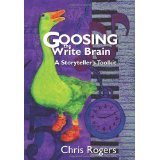PLOT: Grab it any way you can.
This Day 1 of 2015, I’m not starting a new novel, but I am committing to Paradise Cursed, which I started in 2011. With fewer than 100 pages written, I intend to finish a rough draft of the entire book by February 1. First, of course, I have to revisit the original plot to get hold of it again.
Goosing the Write Brain, my tome on writing, contains 75 pages on Plot, but at times like now, when a story is ripe for completion, I visit page 113, “Plot in a Nutshell.” Some writers love plotting, some hate it. Some writers plot a story to the end in incremental detail, while others prefer to work “organically,” letting the story unfold on the page as it unfolds in the mind.
I strongly believe that whatever works for you, do it. On the other hand, if you’ve been “going to write” that novel for years and can’t seem to begin, or if you’ve started one or more and can’t get past the middle, then maybe you’d like to join me on Page 113.
Setup:
Begin with an idea that hooks you. Ideas are everywhere.
Pinpoint the prize for which opposing characters are willing and ready to fight—murder, treasure, a missing child, honor …
Devise a central character who will take immediate aggressive action to win the prize.
Decide, as Alfred Hitchcock once said, what your hero will need to do, then give your hero the knowledge, skills, and abilities to make success plausible. It’s good if the reader can like and approve of the hero. But don’t discount the lovable rascal, part hero, part villain. Feelings, not just greed or duty, should be the motivating force.
Pick a moment that will plunge the character into exciting action, then open the starting gate.
Complications:
Pit the hero against a worthy opponent. Remember: the hero’s strength equals the villain’s strength.
Outline the dangerous step-by-step action your character must take in the face of unanticipated developments to solve the murder, find the treasure, or rescue the missing child.
Payoff:
Work out a satisfactory conclusion in which the character your reader wants to win wins. A climax needs an unanticipated twist: Someone thought to be dead is actually alive/or vice versa. The coins thought to be counterfeit are actually platinum. The child was not kidnapped but is hiding from the rescuer.
Be sure to plant elements that make the twist plausible. And make sure the winner deserves to win.
When imagining the infrastructure of a house, Plot represents the timbers. Once they are placed, we can add any sort of organic or architectural embellishment to flesh out the story. But only by previously envisioning a desired result can we know where to place the timbers.
So on with Paradise Cursed, a story of pirates and a Caribbean cruise and paranormal happenings.
 Goosing the Write Brain: A Storyteller’s Toolkit, is available at Amazon.com.
Goosing the Write Brain: A Storyteller’s Toolkit, is available at Amazon.com.
 This unfinished watercolor painting is a character from Paradise Cursed. It, too, if God’s willing and the creek don’t rise, will be completed by Feb. 1. Please, dear friends, help me stay focused as you did in 2014.
This unfinished watercolor painting is a character from Paradise Cursed. It, too, if God’s willing and the creek don’t rise, will be completed by Feb. 1. Please, dear friends, help me stay focused as you did in 2014.



